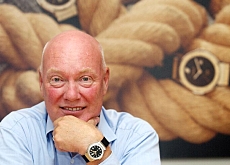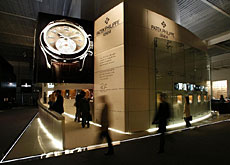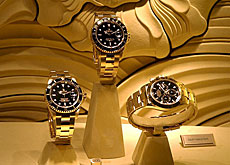Business is booming but watch out

The boom at the top end of the Swiss watch industry benefits the prestige brands but it is also dangerous, Hublot CEO Jean-Claude Biver tells swissinfo.
Biver, who was responsible for the renaissance of the watchmaking brand Blancpain, also explains why people who own luxury watches don’t use them for telling the time.
After Biver took the helm of Hublot in 2004 – “hublot” is French for porthole – turnover at the company, which is based in Nyon, western Switzerland, increased rapidly.
He also has ambitious goals with his philosophy of fusion – the fusion of unusual materials such as gold with ceramic, Kevlar with red gold, tantalum with rubber.
The company’s “Big Bang” watch, which last December took a prestigious Geneva design award – and which can cost up to €13,000 (SFr20,000) – is the best example of this.
Biver is currently mingling with the “who’s who” of the watch world at Baselworld, the annual showcase of the watch and jewellery industry.
swissinfo: How important is Baselworld for watch companies?
Jean-Claude Biver: It depends how big the company is. The bigger the company, for example Rolex or Omega, the less the Basel fair is important in turns of turnover. The smaller the company, like Blancpain or Hublot in the luxury brand, the more important it is. For Hublot, it represents something like 40 per cent of our [annual] turnover.
Small companies don’t deliver watches out of stock but out of the order book. During Basel we get a lot of orders and after that we produce.
swissinfo: What do you have to do in Basel to convince people to buy?
J.-C. B.: I have to present an attractive desirable collection and I have to confirm deliveries that are not longer than six months.
Certain pieces are made for the Middle East [clientele] and Middle East people go to London, Paris or Los Angeles during the summer, so you will need those pieces between June and mid-September at the latest. For other markets you will need the goods for October and November.
swissinfo: How do you prepare for Basel?
J.-C. B.: We prepare for Basel about 12 to 18 months before [the event]. We have been preparing for 2007 more or less since last November. It’s difficult because 18 months is quite a long time and a lot can happen. But we are like fashion that also has to prepare in advance.
swissinfo: How much entertaining goes on there?
J.-C. B.: If you are a very strong brand you need to entertain much less. If you are a weak brand you have to entertain more. I think a couple of million Swiss francs must be spent on entertaining in Basel.
swissinfo: Since you make 40 per cent of your turnover at Basel, do you return to the office and relax?
J.-C. B.: No, you don’t. You go back to work because that 40 per cent has to be delivered within four to six months at the latest, so there’s a lot of stress to get all the pieces out on time. If you cannot deliver by the end of the year, you get cancellations.
swissinfo: Does the world economy’s relatively good health make life easier for you?
J.-C. B.: It makes life for us easier but also dangerous. Success when the economy is pushing is very difficult to manage because you have to differentiate between how much is due to you and how much to the market. Today everybody thinks he’s a genius because it’s the market that is good, not necessarily the people.
swissinfo: To what extent are watches at the top end of the market status symbols, a way of expressing who you are or what you want to be?
J.-C. B.: When people buy our watches, they look at the watch and not at the time. It’s like when you invite a girlfriend for dinner. You don’t really care about the quality of the food – you care to be with her in a restaurant!
swissinfo-interview: Robert Brookes
Jean-Claude Biver and his friend Jacques Piguet bought the dormant Blancpain brand in 1981 at a time when quartz had become king and the mechanical watch was considered dead.
In 1992, having put the Blancpain name firmly back on the watchmaking map, they sold the brand to the Swatch Group at a handsome profit. Biver remained as managing director and a board member of the Swatch Group until 2003.
Since 2004 Biver has taken on a new challenge as chief executive and board member of Hublot, which is based in Nyon, western Switzerland.
This year’s Baselworld features 2,127 exhibitors from the watch and jewellery industry.
There are 283 Swiss brands in the watchmaking section and 53 Swiss brands in the jewellery section.
As a sign of expansion, the average stand size per exhibitor has increased from 39 to 52 square metres over the past five years.
This year’s fair runs until April 6.

In compliance with the JTI standards
More: SWI swissinfo.ch certified by the Journalism Trust Initiative



You can find an overview of ongoing debates with our journalists here. Please join us!
If you want to start a conversation about a topic raised in this article or want to report factual errors, email us at english@swissinfo.ch.